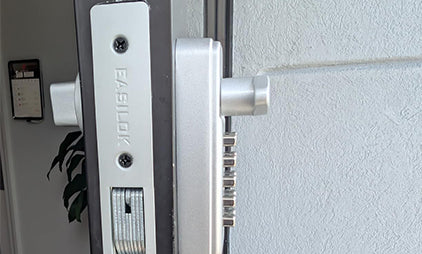
Top Storefront Security Mistakes Small Business Owners Must Avoid
Share
Storefront security is often overlooked until a break-in, attempted theft, or internal incident forces a business owner to take action. In many cases, the problem is not a lack of security investment, but avoidable mistakes in access control, lock selection, and daily management. Understanding these weaknesses is the first step toward preventing loss, protecting staff, and maintaining a safe commercial environment.
This article highlights the most common storefront security mistakes and offers clear guidance on how business owners can avoid them.
Relying on Traditional Keys for Access Control
Many storefronts still depend on basic keyed locks. While familiar, traditional keys are a major security risk. They can be copied without permission, lost by employees, or kept by former staff. Re-keying is expensive and does not solve the root problem—lack of control.
Upgrading to a keyless solution, such as a mechanical keypad lock, eliminates these risks and gives owners full control over entry. Codes can be changed at any time, preventing unauthorized access and removing the vulnerability of duplicated or missing keys.
Using Residential Locks on Commercial Storefront Doors
Some small businesses install residential-grade locks on aluminum-frame glass doors to reduce cost. However, residential locks are not designed for commercial use. They are easier to force open, less durable under heavy traffic, and incompatible with Adams Rite-style commercial mortise setups.
Storefront doors require commercial-grade locks engineered for frequent operation, tamper resistance, and metal-frame installations. Choosing proper hardware is not an upgrade—it is a minimum standard for protecting a business.
Over-Depending on Smart or Electronic Systems
Electronic smart locks appeal to business owners because of remote control and digital features. However, they introduce new vulnerabilities: network failure, low battery, software bugs, and hacking risk. When a lock depends on Wi-Fi or mobile apps, any technical problem can delay access or weaken security.
For many retail and service businesses, mechanical keypad locks offer a safer balance—no electronics to fail, no wireless exposure, and consistent operation in any condition. Technology is useful, but only when reliability is guaranteed.
Ignoring Temporary Access and Employee Turnover
One of the most overlooked security risks is access creep—too many people retaining access for too long. When former staff, contractors, or cleaners keep keys or codes, the storefront becomes vulnerable from within.
The solution is a structured access policy:
-
Update codes immediately when staff changes occur
-
Avoid sharing the same key or code indefinitely
-
Limit access only to current personnel
-
Review access regularly
Mechanical keypad locks make this process easier, especially when owners can change the entry code themselves in minutes.
Delaying Hardware Upgrades and Repairs
Loose cylinders, worn latches, and outdated locks are often ignored until failure occurs. A single point of mechanical weakness can invite forced entry or cause lockouts during operating hours. This leads to downtime, repair fees, and preventable risk.
Storefront hardware should be inspected regularly and replaced when necessary, particularly if the lock is old, key-based, or visibly damaged. Modern mechanical keypad locks and Adams Rite replacement units offer faster installation and long-term durability.
No Clear Plan for After-Hours Security
Even with a good lock, storefronts remain exposed if the business has no security routine. Clear closing procedures, controlled access, proper lighting, and reinforced entry points all play a role. A reliable lock is the foundation, but it must be paired with consistent daily practices.
Conclusion
Most storefront security failures come from avoidable mistakes—not professional criminals. Choosing commercial-grade hardware, eliminating key-based risks, managing access proactively, and avoiding over-dependence on electronics can drastically reduce vulnerability. For many businesses, a reliable mechanical keypad lock provides the simplest and most effective path to better protection and peace of mind.
FAQ
What is the biggest storefront security mistake?
Using traditional keyed locks and losing control of who can enter.
How often should access be updated?
Codes or permissions should be changed whenever staff changes occur or at regular intervals.
Are mechanical keypad locks suitable for commercial doors?
Yes. They are frequently used on Adams Rite-style storefront doors for their durability and keyless convenience.


1 comment
Have you seen this video? https://www.youtube.com/watch?v=3lS5_6D4q9k